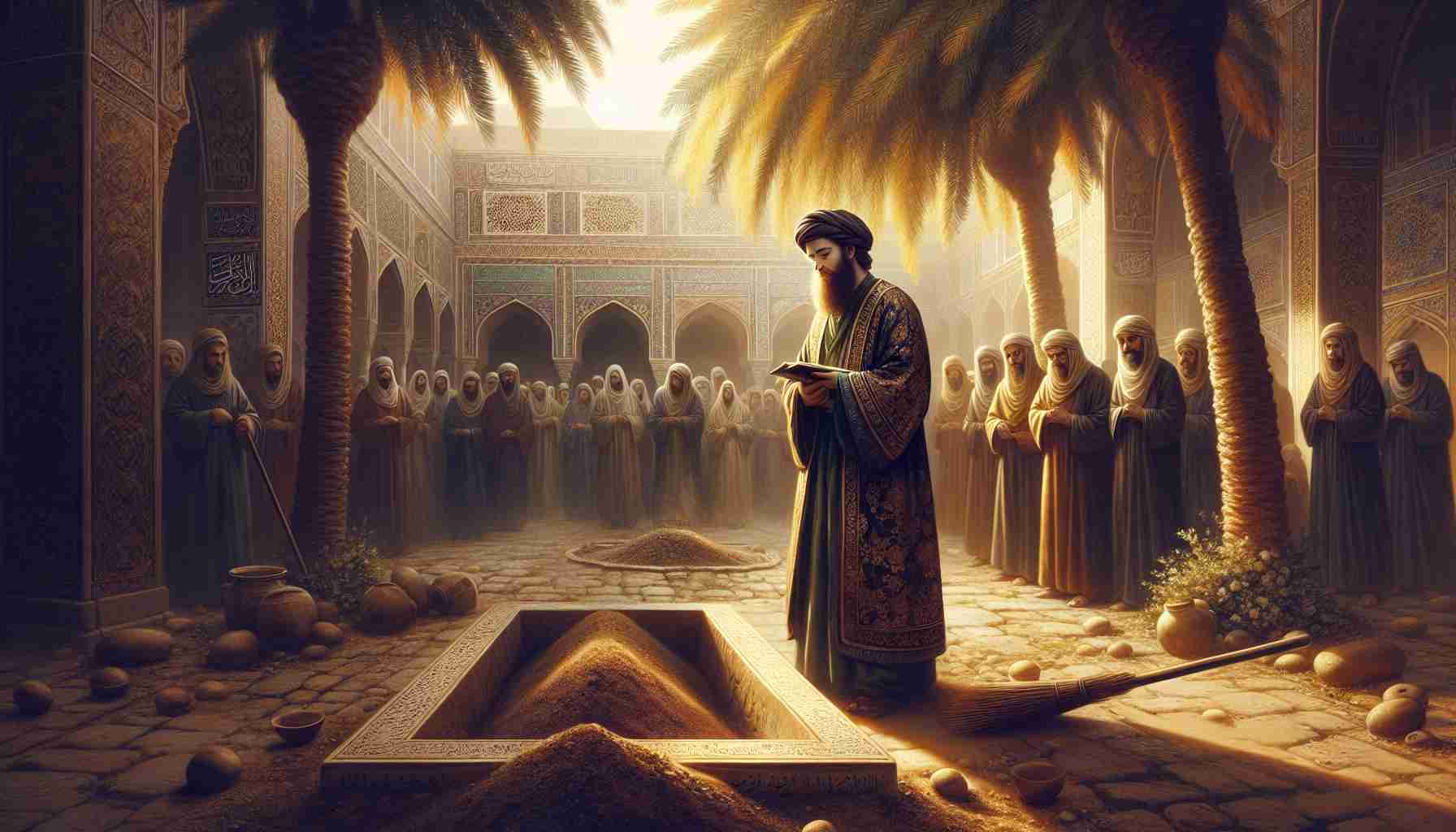

I remember the day Ibrahim died like the sky remembers the thunder—quiet, but aching. I was a young servant in the house then. You won’t find my name in any hadith, but I was there in Medina on that morning, close enough to hear the silence of sorrow.
Ibrahim was the son of Prophet Muhammad ﷺ. The Prophet ﷺ had waited many years before Allah blessed him with a son through his wife Maria. Ibrahim was still a child, just around sixteen or eighteen months old, when he fell ill. We all prayed. Even the palm trees around the house seemed to stand still, as if they were praying too.
I was sweeping the courtyard when I heard a sound that made my hands stop. It wasn’t loud. Just... heavy. I turned and saw the Prophet ﷺ holding the lifeless body of his son. He pressed the small child gently to his chest. His eyes, usually so calm, so bright upon the truth of Allah, were wet with tears.
Someone nearby said, “O Messenger of Allah, you too are crying?”
He replied, voice thick with grief, “The eyes weep, and the heart grieves, but we do not say except that which pleases our Lord.”
I had never known that you could cry and still be strong. I had always thought crying was weakness. But there he was—the Messenger of Allah ﷺ—shedding tears, not from anger at Allah or questioning His will, but out of love.
He kissed Ibrahim’s forehead. “O Ibrahim,” he whispered, “we are very sad because of your departure.”
It hurt to watch, but even in his sadness, the Prophet ﷺ taught us something. That day, I learned that grief does not mean faith is gone. That our hearts can ache, our eyes can pour, yet our tongues can still praise Allah.
I followed behind as they took little Ibrahim to the graveyard. The sun was hot above Medina, but the Prophet ﷺ walked slowly, putting his son gently into the earth. He did not cry out. He did not blame. He remembered Allah, even in his pain.
Later, as we sat in the courtyard again, someone said the sun had darkened that day because of Ibrahim’s death. But the Prophet ﷺ corrected them. “The sun and the moon,” he said, “are signs of Allah. They do not eclipse for the death of anyone.”
His words held more than just truth. They held mercy. He reminded us not to attach nature's signs to people, but always look back to Allah.
That day, I watched a father bury his son and still speak words of trust in Allah’s qadr—His divine plan.
And from then on, I never thought of tears as weakness again. I thought of the Prophet’s tears—how even they were a form of praise.
Story Note: Inspired by authentic hadith in Sahih Bukhari #1303, where the Prophet Muhammad ﷺ mourns the passing of his son, Ibrahim.
I remember the day Ibrahim died like the sky remembers the thunder—quiet, but aching. I was a young servant in the house then. You won’t find my name in any hadith, but I was there in Medina on that morning, close enough to hear the silence of sorrow.
Ibrahim was the son of Prophet Muhammad ﷺ. The Prophet ﷺ had waited many years before Allah blessed him with a son through his wife Maria. Ibrahim was still a child, just around sixteen or eighteen months old, when he fell ill. We all prayed. Even the palm trees around the house seemed to stand still, as if they were praying too.
I was sweeping the courtyard when I heard a sound that made my hands stop. It wasn’t loud. Just... heavy. I turned and saw the Prophet ﷺ holding the lifeless body of his son. He pressed the small child gently to his chest. His eyes, usually so calm, so bright upon the truth of Allah, were wet with tears.
Someone nearby said, “O Messenger of Allah, you too are crying?”
He replied, voice thick with grief, “The eyes weep, and the heart grieves, but we do not say except that which pleases our Lord.”
I had never known that you could cry and still be strong. I had always thought crying was weakness. But there he was—the Messenger of Allah ﷺ—shedding tears, not from anger at Allah or questioning His will, but out of love.
He kissed Ibrahim’s forehead. “O Ibrahim,” he whispered, “we are very sad because of your departure.”
It hurt to watch, but even in his sadness, the Prophet ﷺ taught us something. That day, I learned that grief does not mean faith is gone. That our hearts can ache, our eyes can pour, yet our tongues can still praise Allah.
I followed behind as they took little Ibrahim to the graveyard. The sun was hot above Medina, but the Prophet ﷺ walked slowly, putting his son gently into the earth. He did not cry out. He did not blame. He remembered Allah, even in his pain.
Later, as we sat in the courtyard again, someone said the sun had darkened that day because of Ibrahim’s death. But the Prophet ﷺ corrected them. “The sun and the moon,” he said, “are signs of Allah. They do not eclipse for the death of anyone.”
His words held more than just truth. They held mercy. He reminded us not to attach nature's signs to people, but always look back to Allah.
That day, I watched a father bury his son and still speak words of trust in Allah’s qadr—His divine plan.
And from then on, I never thought of tears as weakness again. I thought of the Prophet’s tears—how even they were a form of praise.
Story Note: Inspired by authentic hadith in Sahih Bukhari #1303, where the Prophet Muhammad ﷺ mourns the passing of his son, Ibrahim.